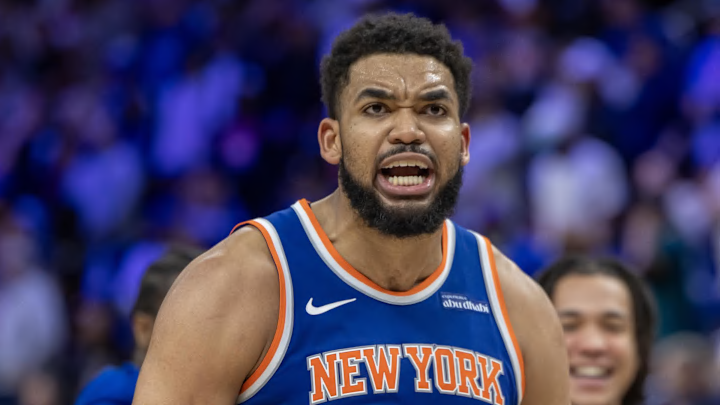Karl-Anthony Towns is eligible to sign a two-year, $149.8 million extension this summer that, quite frankly, the New York Knicks probably should not offer. But there is an alternative scenario in which the big man can sign a three-year deal that saves the team serious long-term money, extends the shelf life of the core, and allows the front office more flexibility on the trade and free-agency markets.
Here’s how this would work: Towns currently has a player option for the 2027-28 season worth $61 million. That projects to be around 32.6 percent of the salary cap. Under the current extension rules, he is allowed to decline said player option this summer, and sign a three-year deal that lowers his average annual price point.
Just as an example, the Knicks could offer him a three-year, $162 million contract that begins at $50 million in the first season (2027-28). This shaves more than $11 million off his player-option money, bringing him down to around 26.7 percent of the salary cap.
That is a huge deal given how difficult it will be for the Knicks to navigate the dreaded aprons in the coming years. Consider their 2027-28 cap sheet specifically. They will pay a combined $86 million for Jalen Brunson and OG Anunoby. If they pencil in $60-plus million for Towns, they’re already brushing up against the $150 million mark. And that’s before adding in Mikal Bridges, who will either sign an extension this summer, or command a new deal in 2026 free agency.
Right now, the projected salary cap for 2027-28 is $187.1 million. The Knicks are on track to exceed that number with just four players. That doesn’t leave much room to effectively flesh out the roster, and the prospect of hitting the second apron ($228.6 million) will severely limit what they can do in trades.
Why Karl-Anthony Towns would take a pay cut for the Knicks
Reactions to this idea will feature some variation of “Why would Towns sign for three years and $162 million when he can get basically $150 million in a two-year extension?” And that’s a fair point.
But this all presumes the Knicks will actually offer him the $150 million. They probably won’t. Towns will be entering his age-33 season when his current contract ends. There’s no guarantee he’s still a max player at that time.
The bar for paying stars is also going up. Teams will no longer hand out max deals willy-nilly as they look to juggle sustainable windows with the realities of the Apron(s) Era. We don’t quite know the extremes to which players who aren’t surefire top-15 stars will be impacted, but it’s going to happen. (Keep an eye on Trae Young’s extension eligibility this summer. He could be the first star to feel the squeeze, and end up signing for below-max money.)
Towns will not be immune to this effect. Especially at that point in his career. It would be a genuine shock if he even declined his 2027-28 to hit unrestricted free agency. Suitors other than the Knicks could max him out at that time for four years and $281.6 million. A three-year max, meanwhile, would run $212.2 million. Do we really think any team is shelling out that much for a big man with defensive limitations about to enter his mid-30s?
For Towns, declining his 2027-28 player option and extending at a lower number is about locking in more security. Guaranteeing yourself $162 million over three years is better than having that $61 million player option and no feel for what comes next. He would need a two-year, $100 million in free agency just to break even from this scenario.
Extending Towns could be even cheaper than the Knicks realize
To that end, given the direction of the league, Towns could feasibly extend for even less.
Maybe the Knicks can get him for a flat three years and $150 million. Or perhaps he’s willing to start that extension at $45 million (24 percent of the cap), with raises that bring its three-year total to $145.8 million.
This is all hypothetical. Towns may believe he has more long-term leverage, or will age well enough to continue making max or near-max money. New York should hold off if that's the case. But there is a reality in which extending him makes sense—and improves the Knicks' future outlook.
